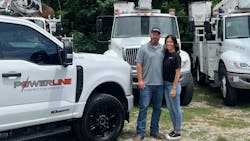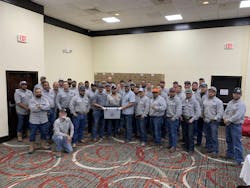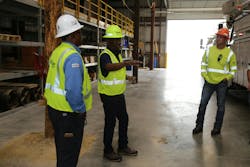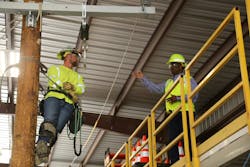Lineworkers to Leaders: Career Advancement in the Line Trade
Lineworkers often spend their entire careers in the field, powering their communities and restoring electricity following severe storms. Some journeymen, however, rise in the ranks to executive management while others leave their companies to launch their own businesses from the ground up.
Moving from the field to the office, however, isn’t always easy for journeyman lineworkers who love being outside, scaling structures and getting the power back on.
“It’s still a battle we face today,” says Aaron Palmer, a journeyman lineworker who started his own company, AMP Utility Services in Corpus Christi, Texas. “You never get rid of the urge to strap on your hooks and climb.”
Even so, starting a business can be rewarding for lineworkers. Just ask Chad Dubea, who started working full-time for Red Simpson right out of high school, and then a decade later, had the opportunity to start his own company — T&D Solutions. In 2005, his company started with 15 people and by 2013, it employed 1500 people. Understanding the business side of building power lines and being able to start a company and be successful was the highlight of his career, he says.
“I think everybody should give it a shot if they have the opportunity,” Dubea says. “I was actually comfortable being on a line crew and then had the opportunity to move into management and that kind of prepared me for starting T&D, and that was the greatest learning experience.”
He urges any journeyman lineworkers who have the opportunity to start their own company to go for it. At the same time, he says they must be willing to do things that others are not willing to do and put in hours others aren’t willing to put in.
“I know a lot of people think if you own your own company, it’s easy, but that’s when the work really starts,” Dubea says. “You have people who are depending on you, and you have to make sure that you are providing them with a safe place to work with the right equipment and tools.”
After starting his own company and selling it to a private equity firm, he was able to help two other lineworkers — Palmer and Tim Greenwood — also launch their own businesses.
“I have a lot of faith in them, and I feel like their hearts are in the right place,” he says. “Without having an opportunity to start my own business, I wouldn’t have been able to do it. I really like it when guys want to give their lives to their companies and provide a good quality, safe place for people to work.”
Here are the stories of three lineworkers who made the leap from the line trade to the corporate world including Greenwood, Palmer and Patrick Smith of Ameren Illinois. They describe their early years in line work and how they made the transition to management, whether at their same utilities or through their own businesses.
Moving from Line Foreman to CEO
As the son of a lineworker in California, Greenwood was inspired to pursue a career in the line trade. He graduated from the South Eastern Line Construction Apprenticeship Training (SELCAT) and has 20 years of experience as a lineworker, foreman and general foreman. His brother, Jacob, also became a journeyman lineworker as well.
Greenwood says his first job in the line trade was as a groundsman for Red Simpson. As a 19-year-old apprentice, he learned the importance of safety.
“I climbed a pole to hang a guard arm for a guard structure we installed to pull wire over the 495 Freeway in Baltimore, Maryland,” he says. “I took a shortcut and didn’t put a bolt through the pole to hang the guard arm, and the sling came loose and choked around both of my wrists as I was climbing down the pole. Luckily, it was still hooked to the crane, and the operator cabled it up in time to save my hands and wrists. I learned right then that shortcuts aren’t worth it.”
During his career in the field, he worked through many storms, including a three-month restoration in the Bahamas, before deciding to go into leadership. After working for other companies, he was driven to learn how they operated and see if he could do it better on his own. He recently launched his own company, Powerline Construction Services LLC in Kingston Springs, Tennessee. As the CEO of the company, he says it mainly specializes in storm work, but they are also actively looking for blue-sky opportunities as well.
“As a company, we go above and beyond on tools so there is no reason for anyone to feel like they need to take a shortcut or not have the proper tool for the job,” he says. “We do this as well for all safety equipment.”
Although he has worked in leadership positions in the field, working in an office full-time presented challenges because he had to depend on others to do their job.
“One of the main struggles for me was to learn patience,” Greenwood says. “When you’re used to getting whatever needs to be done with a purpose, it’s discouraging to have people take a week or more in some situations.”
At the same time, however, he says being a lineworker does help with owning a company in this trade.
“I really think the guys like to be able to come and discuss and communicate with me because they know I understand what they are talking about,” he says.
He advises other lineworkers who want to one day become an executive or run their own company that they are never too old to learn something new. Also, he emphasized that relationships are very important.
“Make sure you are ready to work harder for yourself than you did for anyone else,” Greenwood says. “My plan for the future is to be the most efficient company in this line of work.”
Launching a Texas Company
Another journeyman lineworker for Red Simpson, Palmer, also launched his own business — AMP Utility Company in Texas. He is also the son of a journeyman lineworker, who started out working for the company as a mechanic before going to line school. For his own path in the line trade, Palmer says his apprenticeship wasn’t without its challenges.
“I floated between multiple crews while trying to learn everything I could from everyone around me,’ he says.
In 2004, he started line work with Red Simpson, Inc., just before Pike Electric bought the company out a year later. Between 2004 and 2014, he worked all aspects of line work — Urd, transmission, fiber and distribution. He also worked his share of storms including in Florida and following Hurricane Sandy, which hit New York City in 2012. He also served a variety of different roles including groundman, operator, apprentice, B lineman, Class A lineman, journeyman and foreman.
“Once I became a foreman, I led one of the safest and most profitable crews at T&D Solutions before getting the opportunity to become a general foreman in 2014,” he says. “I was able to grow my area from three crews to a little over 22 crews.”
In 2016, he got promoted to division manager, and then three years later, he took a retirement severance from Volt Power to fulfill his dream of starting and owning his own company.
“I wanted to show everyone that if you work hard and stay out of politics, you could go anywhere in this industry,” he says.
Because he knows a lot of his employees from when he was in the field, it makes it easier to connect with them. He also says having a good relationship with the customers always makes things easier.
“Learning from your past and correcting your future will always provide knowledge,” Palmer says.
Rising to Executive Management in Illinois
Patrick Smith, senior vice president of operations and technical services for Ameren Illinois, believes for him, the seed of interest in the line trade was planted subliminally, more than a decade prior — as a “sleeper dream” waiting to be activated. Years ago, after a power outage in East St. Louis, as an eight-year-old boy, Smith peered out his kitchen window into his backyard to see something he had never before seen — a Union Electric truck and crew there to restore power to his home.
“I just remember looking out the kitchen window, looking at the guy in the aerial truck, lifted up, working,” he says. “It was novel for me and very interesting to see.”
Fast forward, just over a decade, to when he was 20 years old and landed his first job as a meter reader for the East St. Louis office of Union Electric. After working in this position for about 18 months, he successfully bid on an apprentice lineworker job. As such, he bought his own belt, climbing tools and hand tools from a retiring Union Electric lineworker named Harry Niedermeyer.
“When I met this gentleman, I realized that he was the guy who had been in my backyard when I was eight years old,” he says. “The guy who I first saw doing line work more than a decade earlier was the guy who provided me the tools I used to enter the trade.”
In 1991, Smith completed his 48-month apprenticeship training program in 42 months. He was paired with another apprentice, and they did everything together.
“Our days were always interesting, but rarely easy,” he says. “Training as an apprentice is a mental and physical challenge.”
He better understood the need for the intensity later when he became a journey lineworker.
“There are endless situations that lineworkers will be faced with that require sharp minds and durable bodies,” he says. “We trained on overhead and underground electrical distribution and
even had the opportunity to do some transmission and substation work. While not overjoyed while I was going through it, I now look back on my apprentice lineworker training with fond memories and appreciation.”
During his apprenticeship, he had the opportunity to work his first storm and traveled to Indiana to restore power. Everything he did and most things he encountered were new experiences.
“I remember thinking, ‘just trust the folks around you,” he says. “I was eager, yet terribly inexperienced, and I learned more on that job than I did in six months of training.”
After spending three-and-a-half years in the apprentice program, he worked three-and-half years as a journey lineworker. Most of the time he was a crew member, however, he did get the opportunity to rotate into crew leader and responder roles.
Like many lineworkers, he did not have a burning aspiration to stop doing line work and go into leadership. At the same time, he did want the opportunity to interview, understand the process and gain insights on how to be prepared when the opportunity came up again.
“I always thought I was designed to coach and lead, and my far-sighted aspirations included me in a leadership role,” says Smith, who has a passion for coaching youth sports. “I see leadership in the industry not measurably different than coaching a sports team. Coaching and investing in people are things I enjoy, and if I can lead in that fashion, I knew I would enjoy being a leader within our company.”
“I had never had a job where I dressed business casual or business, but that turned out to be the least of my blind spots,” he says. “Being promoted into leadership of the people who trained you was more difficult than I imagined. My perception was my reality, and I sensed I wasn’t the preferred choice by many of the veteran coworkers.”
It turns out there was a crew leader, who most assumed would land the position, including Smith, and it was a surprise when it was announced that Smith got the job. It was also the first year that the utility used an interview committee, and two of the four committee members were from other parts of the business.
“Yet, while I was surprised, I was not overwhelmed, and although I faced an obvious bit of resentment, I felt ready to lead,” he says. ‘This was 1995, and frankly, there was some ‘legacy thinking’ I also had to navigate. This was not new to me, and I understood, excellence of performance would supersede all man-made biases. So, I focused on serving my team with excellence, and over time, I gained the respect of the teams.”
He says he values his field experience, and it serves him well, as long as he keeps it all in perspective.
“I’m a black-and-white TV compared to the high-definition talented lineworkers who I get to work with at Ameren,” he says. “What resonates most is that I understand their journey. I understand their grind. When encountering our coworkers in the field, I don’t lead with that part of my experience, but it usually comes up, and our shared experiences fuels an eased conversation. I typically feel as I’m walking away, they know I ‘saw’ them.”
Eight Tips for Launching a Successful Business in the Line Trade
Chad Dubea ran his own company in the line trade before helping others to start their own businesses on both the union and non-union side.
“I want to be able to change the mindset of the power line industry to where companies, their teams and their unions can work together in harmony for a safer line trade,” he says.
To that end, he offers these suggestions for other lineworkers looking to start their own companies.
- Know the bottom line. Understand your cost structures for equipment, labor, safety and training. “You have all these huge costs that are imperative to running a successful business,” he says.
- Identify the customers to target. For example, you can go after IOUs, municipalities or co-ops, he added. “Our industry is such a large industry yet so small, and the opportunity’s there,” he says. “A lot of time, they come from the work they’ve already done in the past for people, and these customers are willing to help them get started because they know the character of the individual and know that they will provide a good quality product to them.”
- Be on the same team with your employees. “Of course, you go from being in a group with your peers to being over them, but I never looked at it that way,” Dubea says. “I felt like the guys knew me from a young age, and they knew that I was willing to work and really cared about them and their family.”
- Cherish your field experience. Because of his relationship with his lineworkers, Dubea says it was an easy transition from the field to leadership. “You could do it without having the experience,” he says. “There’s a bunch of them that do, but really knowing what the guys and gals go through in the field, I feel like it does help a lot, and you can understand their frustrations and what they go through more than someone who hasn’t actually worked out in the field.” Case in point: when his company was first starting to introduce sleeves into the field before it was a requirement, some of the management wore sleeves in the office. Wearing them in an air-conditioned indoor setting and putting them on in the intense Texas heat, however, are two completely different things. Through his field experience, he felt like he knew what they were going through.
- Care about your employees. “I care about the guys in the field so much more because I can relate to them and sympathize what they are going through for sure,” he says.
- Do what is necessary to get the job done. When Dubea first started his business, he helped to deliver trucks, put tools on the trucks and work out in the field with the crews. “Starting a business isn’t easy,” he says. “To make it successful, you have to be part of it every day. If you care for your people, your customers, your fundamentals and your processes, everything is going to work out, your finances will come and you can really grow a good business.”
- Take the time to grow your business. To scale its business, T&D Solutions partnered with a private equity company and acquired other companies in North Carolina and Kentucky that fit their model. “We took the time to let those guys who wanted to be part of T&D join us,” he says. “We didn’t force it down their throat. We showed them what they were doing and how we operated, and eventually, it came to where people just wanted to be part of the whole group and the things that we were doing at the time.”
- Build a positive safety culture and give back to your people. For example, when he worked for Red Simpson, he earned bonuses and came up in a positive work environment. “If you can, share the wealth with your people and keep your team and the families involved,” he says. “To have a better safety culture, I think it just takes getting everyone involved.”
Rising in the Ranks: Advice for Aspiring Executives
Patrick Smith is not sure how he encountered this quote by Theodore Roosevelt, but it has been one of his key motivators as long as he can remember. He said: “Do what you can, with what you have, where you are…”
“Focusing on making the best of your situation and demonstrating to yourself that you have the capability to be an additive influence is a liberating and inspiring investment,” he says. “My father used to tell me, ‘You can fool others, but you can’t fool yourself.”
He says there are endless recipes to becoming an executive in the industry. Here are some of the ingredients he feels will be helpful for lineworkers looking to move into executive management.
- Develop a default sense of curiosity. Question most things and maintain a thirst for “why,” and not just “how” or “what.”
- Read something every day that improves your understanding on the business you seek to lead. As little as 15 minutes daily can change your trajectory, he says.
- Engage people with fairness and empathy. “If you get the people thing right first, everything else is just easier,” he says.
For those lineworkers who are prospective entrepreneurs, he says it’s important for them to understand how to leverage a fairly simple business concept—Porter’s Five Forces.
“For business owners, there is an emotional connection to their business concept that will likely serve as a gift and a curse,” he says. “It fuels the passion one needs to weather the storms, but it can also create a blindness to the realities of the idea and the market it operates in. In the early stages, Porter’s Five Force analysis can drive the objective review needed to refine concepts or even defer if necessary.”
Beyond this, he suggested the following other tips:
- Understand the digital nature of the emerging markets and how their business fits in and communicates with their customers.
- Grow slow. Generate sustained value in the controlled market, then scale.
- Seek opportunities to partner and collaborate. “Someone’s idea might be the missing piece to yours.”
About the Author
Amy Fischbach
Electric Utilities Operations
Amy Fischbach is the Field Editor for T&D World magazine and manages the Electric Utility Operations section. She is the host of the Line Life Podcast, which celebrates the grit, courage and inspirational teamwork of the line trade. She also works on the annual Lineworker Supplement and the Vegetation Management Supplement as well as the Lineman Life and Lineman's Rodeo News enewsletters. Amy also covers events such as the Trees & Utilities conference and the International Lineman's Rodeo. She is the past president of the ASBPE Educational Foundation and ASBPE and earned her bachelor's and master's degrees in journalism from Kansas State University. She can be reached at [email protected].





